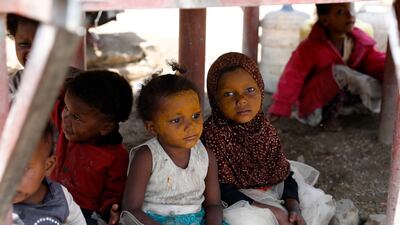On Monday, the US announced that it will increase its aid contribution to Yemen by $165 million – a sum of money that ought to go very far in a nation where nearly three quarters of the population are thought to live in poverty.
But with Yemen's currency and economy in a state of collapse, the value of an aid dollar diminishes by the month. Millions of dollars of humanitarian assistance have been looted and squandered over the course of its seven-year civil war. Food, most of which is imported, has become cripplingly expensive, even for aid agencies.
The Iran-backed Houthi rebel group, which controls large parts of the country, regularly confiscates donations intended to sustain the civilian population, and has attempted to impose a "tax" on aid. Its forces, which include a sizeable contingent of child soldiers, frequently extort bribes from hauliers on the road, driving up the cost of transporting basic supplies.
Even so, 80 per cent of Yemenis are dependent on aid for their survival. Five million are now on the brink of starvation, and tens of thousands are already living in famine conditions. The US contribution, which is intended to assist the World Food Programme with emergency food delivery, is sorely needed. As are those of other international donors. This year, the EU has allocated 95m euros ($111m) to assistance in Yemen, and in February the UAE pledged a further $230m.
But until there is a comprehensive political settlement or, at the very least, a lasting ceasefire, the cycle of aid being donated, misappropriated and devalued will continue. This is unlikely to happen as long as the Houthis remain confident in their ability to maintain control over much of the country militarily.
The Houthis were emboldened at the start of the year, when US President Joe Biden's administration announced it would discontinue its support for the Saudi-led coalition that backs Yemen's internationally recognised government. The rebels received a second wind shortly thereafter, when Mr Biden's State Department removed them from a list of sanctioned terrorist groups.
The conciliatory moves were apparently intended to entice the Houthis to the negotiating table, and to increase the flow of aid to ordinary Yemenis, even with the knowledge that some of it would fall into rebel hands. Instead, the Houthis have charged forward in their military campaign with renewed vigour. The message they received was that they have a free hand to act in Yemen. Since February, their focus has been the capture of Marib, a hydrocarbon-rich city that is now the government's last stronghold in the otherwise Houthi-dominated north.
"Single-minded" is the term Tim Lenderking, the US envoy to Yemen, used in a call with journalists to describe the Houthi focus on the Marib offensive. It is an appropriate descriptor. Few in Marib want to live under Houthi rule. Fighting continues, and hundreds of thousands of civilians are being displaced in the process. But none of this has persuaded the rebels to rethink their strategy, or to consider the well-being of their fellow countrymen and women. None of it has brought them any closer to the negotiating table, despite offers from the Saudi-led coalition and attempts by neighbouring Oman to mediate.
Last week, it was announced that veteran Swedish diplomat Hans Grundberg will succeed Martin Griffiths as the UN's Yemen envoy, pending a vote in the UN Security Council to confirm his appointment. Many are hoping that Mr Grundberg finally will be able to succeed in driving a political settlement, even though realities on the ground remain incredibly difficult. A combination of political and economic support for his efforts and the Yemeni people is vital.


